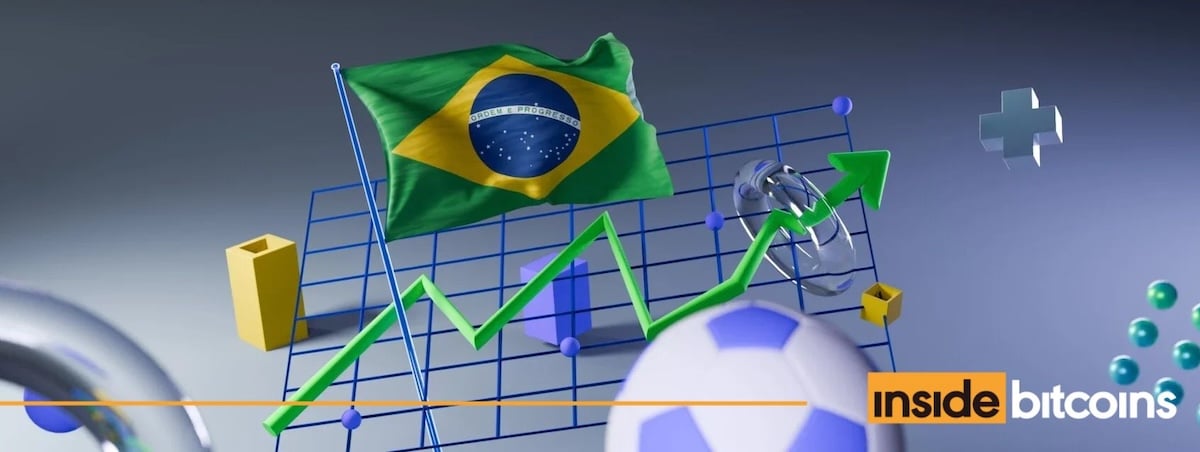Join Our Telegram channel to stay up to date on breaking news coverage
Brazil’s Senate has triggered fierce opposition from the country’s rapidly growing iGaming and sports sectors after advancing Bill 2,985/2023, a comprehensive legislative proposal imposing sweeping restrictions on betting advertising across all media platforms. The controversial bill, championed as necessary protection against gambling addiction and youth exposure, has sparked warnings of financial catastrophe from football clubs, regulatory concerns from operators, and predictions of a surge in illegal gambling activity that could undermine Brazil’s newly regulated market.
The legislative development comes at a critical juncture for Brazil’s iGaming sector, which launched its regulated framework in January 2025 following years of preparation. With the country’s gambling market reaching $3.4 billion in gross gaming revenue in 2024 and continuing rapid expansion, the proposed restrictions represent a fundamental challenge to the industry’s commercial model and growth trajectory in Latin America’s largest economy.
Key Takeaways
- Comprehensive Restrictions: Bill 2,985/2023 prohibits betting ads during live sports broadcasts, bans celebrity endorsements, and severely limits advertising windows across all media.
- Industry Opposition: Over 50 Brazilian football clubs warn of R$1.6 billion ($285 million) in annual losses, predicting financial collapse for smaller teams.
- Black Market Concerns: The Brazilian Institute of Responsible Gaming warns restrictions could increase illegal gambling from 50% to 70% of total market activity.
- Legislative Progress: The bill advances to the Chamber of Deputies after Senate committee approval, with implementation possible within months.
- Economic Impact: Analysts project 15-20% decline in legal operator revenue by 2026 if restrictions are fully enforced.
- Timing Conflict: The legislation contradicts Brazil’s January 2025 launch of regulated betting, which imposed 12% GGR taxes and R$30 million licensing fees.
- International Contrast: Brazil’s approach diverges from European markets like Spain and Italy, which have relaxed similar restrictions due to economic consequences.
Comprehensive Analysis of Bill Provisions
Bill 2,985/2023, spearheaded by Senator Carlos Portinho (PL-RJ), represents one of the most restrictive advertising frameworks proposed in any major gambling jurisdiction worldwide. The legislation’s scope extends far beyond typical advertising limitations to fundamentally restructure how betting operators can communicate with Brazilian consumers.
Live Sports Broadcasting Restrictions
The bill’s most commercially significant provision prohibits all betting advertisements during live sports broadcasts, with exceptions limited to 15-minute windows before and after events. This restriction directly targets the industry’s most valuable advertising inventory, as live sports content delivers the highest engagement rates and most qualified betting audiences.
For context, live sports advertising represents approximately 40-60% of betting operators’ media budgets in mature markets, making this restriction potentially catastrophic for customer acquisition strategies. The timing limitation would force operators to compress their messaging into brief windows when viewer attention may be focused on pre- and post-game analysis rather than commercial content.
Celebrity and Influencer Endorsement Bans
The legislation prohibits active athletes, social media influencers, and other public figures from appearing in betting promotions, with retired athletes restricted until five years after their career ends. This provision specifically targets Brazil’s celebrity-driven marketing culture, where football stars and social media personalities command enormous influence over consumer behavior.
Brazilian betting operators have invested heavily in celebrity partnerships, recognizing the outsized impact of personality-driven marketing in the country’s media environment. Removing this marketing channel would force operators to rely primarily on brand advertising and direct response campaigns, typically less effective for customer acquisition in emerging markets.
Time-Based Media Restrictions
The bill establishes rigid time windows for betting advertisements across different media:
Television and Streaming Platforms: Advertisements restricted to 7:30 PM to midnight, eliminating daytime and prime evening inventory that coincides with major sporting events.
Radio: Limited to morning (9:00-11:00 AM) and evening (5:00-7:30 PM) slots, avoiding peak commuting and sports listening times.
Print Media: Complete prohibition on betting advertisements in newspapers, magazines, and other printed publications.
These restrictions would eliminate approximately 75-80% of currently available advertising inventory, forcing operators to compete for limited premium slots while potentially driving up advertising costs for remaining opportunities.
Stadium and Venue Advertising Limitations
Physical advertising restrictions represent perhaps the most contentious element for football clubs, prohibiting static and electronic advertisements unless operators hold official sponsorship or naming rights. This provision would eliminate lucrative secondary advertising revenue that clubs generate from multiple betting partners while preserving primary sponsorship arrangements.
The stadium advertising market in Brazil generates hundreds of millions of reais annually, with betting operators representing increasingly significant clients for clubs across all divisions. Eliminating this revenue stream would disproportionately impact smaller clubs that lack alternative commercial opportunities.
Mandatory Health Warnings and Digital Safeguards
All remaining advertisements must include the warning: “Betting causes addiction and harm to you and your family,” using language that explicitly associates gambling with negative outcomes. Additionally, digital platforms must implement enhanced age verification and provide opt-out mechanisms for users seeking to avoid betting content.
These requirements reflect a public health approach similar to tobacco and alcohol regulation, positioning gambling as inherently harmful rather than entertainment requiring responsible consumption messages.
Industry Response: Football Clubs Sound Financial Alarms
The proposed restrictions have generated unprecedented unity among Brazilian football clubs, with over 50 teams across multiple divisions issuing joint statements predicting financial catastrophe if the legislation advances unchanged.
Quantified Financial Impact
Club executives project R$1.6 billion ($285 million) in annual revenue losses across Brazilian football, based on detailed analysis of existing commercial arrangements:
Stadium Revenue: Static advertising and electronic displays typically account for 30-40% of club commercial income, with betting operators representing 25-30% of these deals at major clubs.
Sponsorship Disruption: Multi-year partnerships with operators like Betano, EstrelaBet, and Superbet would require costly renegotiation or early termination, potentially triggering breach of contract litigation.
Tiered Impact: While large clubs like Flamengo, Palmeiras, and São Paulo have diversified revenue streams, smaller clubs depend heavily on betting partnerships for operational sustainability.
“We’re not talking about luxury revenue—this is survival money for many clubs,” explained a commercial director at a Série B club who requested anonymity. “Betting partners often provide guaranteed minimums that smaller sponsors won’t match, and losing that income could force clubs into administration.”
Contract Complications and Legal Exposure
Many Brazilian clubs have signed long-term agreements with betting operators, often including guaranteed minimum payments, performance bonuses, and marketing commitments that would become impossible to fulfill under the proposed restrictions. These contracts typically include specific advertising rights that clubs may be unable to deliver, creating potential legal exposure for breach of contract claims.
Industry sources estimate that Brazilian football clubs collectively hold betting sponsorship agreements worth over R$2 billion across multi-year terms, with many deals signed based on current advertising frameworks. Retroactive application of restrictions could trigger widespread contract disputes and financial claims.
Small Club Existential Threat
The impact on smaller clubs appears particularly severe, as these organizations often lack alternative commercial opportunities available to major teams. Third and fourth-division clubs frequently depend on local betting partnerships for 50-70% of their commercial revenue, with few alternative sponsors offering comparable terms.
“For clubs outside the elite divisions, betting sponsors often represent the difference between operating and folding,” noted Carlos Silva, commercial manager at multiple lower-division clubs. “We don’t have the luxury of choosing sponsors—we take what we can get, and betting companies have been willing to invest in smaller clubs when traditional sponsors weren’t interested.”
Operator Concerns: Regulatory Contradiction and Black Market Growth
Brazil’s betting operators have expressed alarm not only about direct commercial impact but about fundamental contradictions between the advertising restrictions and the country’s newly implemented regulatory framework.
Regulatory Framework Contradiction
The proposed restrictions directly conflict with Brazil’s January 2025 launch of regulated sports betting, which established a comprehensive framework including:
- 12% gross gaming revenue taxation
- R$30 million ($5.2 million) licensing fees for operators
- Extensive compliance requirements and reporting obligations
- Consumer protection measures and responsible gambling frameworks
This regulatory structure was designed to channel betting activity into licensed operators while generating substantial tax revenue for public services. The advertising restrictions would undermine these objectives by making it significantly more difficult for legal operators to compete with unlicensed alternatives.
Black Market Growth Predictions
The Brazilian Institute of Responsible Gaming (IBJR) has warned that advertising restrictions could increase illegal gambling’s market share from the current estimated 50% to approximately 70% of total betting activity. This projection reflects the competitive disadvantage legal operators would face compared to unlicensed platforms unbound by advertising restrictions.
“Regulated operators are already competing against illegal sites that don’t pay taxes, don’t implement player protections, and don’t contribute to Brazilian society,” explained Marina Costa, IBJR executive director. “If we then restrict legal operators’ ability to communicate with consumers while illegal operators continue unrestricted marketing, we’re essentially subsidizing the black market.”
Illegal operators typically offer more attractive odds due to tax avoidance, provide less restrictive gaming options, and can market aggressively without regulatory constraints. Adding advertising restrictions to legal operators’ burden could make competition with crypto betting alternatives impossible in many market segments.
Customer Acquisition and Retention Challenges
The restrictions would fundamentally alter how legal operators acquire and retain customers in a market where brand awareness and education remain critical for driving adoption of legal alternatives. With limited advertising windows and restricted content, operators would struggle to:
- Educate consumers about legal betting options and their advantages
- Build brand recognition necessary for customer acquisition
- Communicate responsible gambling messages and player protections
- Compete effectively against unlimited illegal operator marketing
These challenges would be particularly acute for newer operators seeking to establish market presence and for all operators attempting to convert existing illegal market participants to regulated platforms.
Political Dynamics and Legislative Rationale
The advancement of Bill 2,985/2023 reflects broader political dynamics around gambling regulation in Brazil, where public health concerns compete with economic development objectives.
Proponent Arguments and Public Health Focus
Senator Carlos Portinho has positioned the legislation as essential public health protection, stating: “Football clubs are addicted to betting money. We’re facing a pandemic of addiction that requires discipline.” This framing positions gambling as inherently harmful and suggests that commercial relationships between clubs and operators represent problematic dependency rather than legitimate business partnerships.
Original bill author Senator Styvenson Valentim has compared the proposed measures to Brazil’s successful anti-smoking campaigns, which used advertising restrictions, health warnings, and social stigmatization to dramatically reduce tobacco consumption. This comparison suggests an intent to reduce gambling participation rather than simply regulate its promotion.
Public Opinion and Social Concerns
The legislation responds to legitimate public concerns about gambling’s social impact, particularly regarding:
- Youth exposure to gambling marketing through sports programming
- Normalization of betting through celebrity endorsements and sports integration
- Gambling addiction rates in communities with limited economic opportunities
- Consumer debt associated with unregulated gambling activity
These concerns reflect broader international debates about gambling’s appropriate role in society and the balance between personal freedom and social protection.
Economic vs. Health Policy Tension
The political debate reveals fundamental tension between economic development and public health objectives:
Economic Perspective: Supporters of the regulated gambling market emphasize tax revenue, job creation, and channeling economic activity into legal frameworks with consumer protections.
Public Health Perspective: Advertising restriction advocates prioritize reducing gambling participation, particularly among vulnerable populations, regardless of economic consequences.
This tension mirrors similar debates in European markets where advertising restrictions have been implemented, modified, and sometimes reversed based on economic impact assessments.
Proposed Amendments and Compromise Efforts
Recognizing the legislation’s potential economic impact, several senators have proposed amendments to reduce its most severe consequences while maintaining public health objectives.
Romário’s Compromise Proposal
Former football star and current Senator Romário has proposed amendments that would:
- Allow retired athletes to appear in betting advertisements regardless of time since retirement
- Grandfather existing stadium advertising contracts through their current terms
- Create transition periods for clubs to adjust commercial strategies
- Preserve some advertising opportunities during major sporting events
These amendments reflect recognition that immediate implementation could cause disproportionate financial harm while acknowledging legitimate regulatory concerns.
Phased Implementation Timeline
The current bill includes staggered implementation timelines designed to provide adjustment periods:
- Media Restrictions: Take effect 90 days after approval for television, radio, and digital platforms
- Stadium Advertising: One-year grace period before restrictions apply to existing contracts
- Celebrity Endorsements: Immediate prohibition for new agreements, existing contracts honored through current terms
This phased approach aims to balance regulatory urgency with commercial reality, though industry representatives argue the timelines remain insufficient for meaningful adjustment.
International Context and Comparative Analysis
Brazil’s proposed advertising restrictions represent some of the most comprehensive limitations implemented in any major gambling jurisdiction, exceeding restrictions in most European markets.
European Regulatory Evolution
Several European countries have implemented and subsequently modified gambling advertising restrictions based on economic impact assessments:
Spain: Implemented extensive restrictions in 2020 but has gradually relaxed some limitations following industry pressure and economic analysis showing limited effectiveness in reducing problem gambling.
Italy: Maintains significant restrictions but has created exceptions for major sporting events and licensed operator communications.
United Kingdom: Recently increased restrictions on advertising content and targeting but maintains broader advertising opportunities than proposed in Brazil.
These experiences suggest that overly restrictive approaches may require adjustment based on practical implementation challenges and unintended economic consequences.
Regulatory Best Practices
International gambling regulation experts generally recommend balanced approaches that:
- Restrict advertising targeting vulnerable populations (minors, problem gamblers)
- Require responsible gambling messaging in promotional content
- Implement watershed protections for content timing
- Maintain sufficient commercial viability for regulated operators to compete with illegal alternatives
Brazil’s proposed restrictions exceed these recommended parameters, potentially creating implementation challenges and unintended market distortions.
Market Impact Projections and Economic Analysis
Industry analysts project significant market disruption if the advertising restrictions are implemented as currently proposed, with effects extending beyond gambling operators to the broader sports and media ecosystem.
Revenue Impact Modeling
Conservative estimates suggest the restrictions could reduce legal operator revenue by 15-20% by 2026, based on:
- Customer acquisition cost increases of 40-60% due to limited advertising inventory
- Reduced brand awareness leading to lower organic customer acquisition
- Competitive disadvantage against illegal operators maintaining unrestricted marketing
- Higher marketing costs for remaining advertising opportunities
These projections assume partial adaptation through alternative marketing channels, though options remain limited under the proposed framework.
Broader Economic Consequences
The restrictions would impact multiple sectors beyond gambling:
Media Industry: Significant reduction in advertising revenue for television, radio, and digital platforms, particularly sports media properties.
Marketing Agencies: Loss of betting industry clients would impact agencies specializing in sports and entertainment marketing.
Event Production: Reduced sponsorship availability could impact sporting event economics and production quality.
Technology Sector: Reduced investment in advertising technology and digital marketing solutions.
Employment and Investment Implications
The Brazilian gambling industry directly employs an estimated 150,000-200,000 people across operations, technology, marketing, and support functions. Significant revenue reductions could trigger:
- Operator workforce reductions to maintain profitability
- Reduced investment in technology and product development
- Decreased sponsorship and partnership spending
- Lower tax revenue for government programs
These employment impacts would extend beyond gambling operators to include media companies, advertising agencies, and sports organizations dependent on betting industry partnerships.
Conclusion: Regulatory Crossroads for Latin America’s Largest Market
Brazil’s advancement of comprehensive betting advertising restrictions represents a critical juncture for the country’s gambling market and broader regional development. The legislation’s outcome will significantly influence whether Brazil’s regulated gambling framework achieves its intended objectives of channeling activity into legal operators while generating tax revenue and implementing consumer protections.
The unprecedented unity of opposition from football clubs, operators, and industry organizations reflects genuine concern about the restrictions’ economic impact and effectiveness in achieving public health objectives. However, supporters’ emphasis on social protection and addiction prevention addresses legitimate concerns about gambling’s integration into Brazilian society.
As Senator Portinho noted: “We’re facing a pandemic of addiction that requires discipline.” The challenge lies in implementing that discipline through measures that protect vulnerable populations without undermining the regulated market’s viability or inadvertently strengthening illegal alternatives.
The legislative process continues as the bill advances to the Chamber of Deputies, where further debate and potential amendments may modify its final form. The outcome will establish important precedents for gambling regulation across Latin America, where multiple countries are considering their own regulatory frameworks.
For Brazil’s gambling industry, the coming months represent a critical period for engagement with lawmakers, public education about regulated gambling’s benefits, and demonstration that responsible marketing can coexist with consumer protection objectives. The stakes extend far beyond commercial interests to encompass the fundamental question of whether Brazil can successfully implement a regulated gambling market that serves both economic development and social protection goals.
As the IBJR concluded in its analysis: “The choice is not between gambling and no gambling – it’s between regulated gambling with protections and illegal gambling without any safeguards. These restrictions risk pushing Brazilian consumers toward the latter option, which serves no one’s interests except illegal operators.”
References
- Yogonet. (2025, May 29). “Brazil moves closer to tightening betting ad rules as Senate prepares to vote on new restrictions.”
- iGaming Business. (2025, May). “Brazil sports commission restrictions betting ads.”
- Intergame Online. (2025, May). “Brazilian betting advertising restrictions bill moves forward.”
- Games Brasil. (2025, May 29). “Sports betting and iGaming companies warn that advertising ban favors illegality.”
Join Our Telegram channel to stay up to date on breaking news coverage


